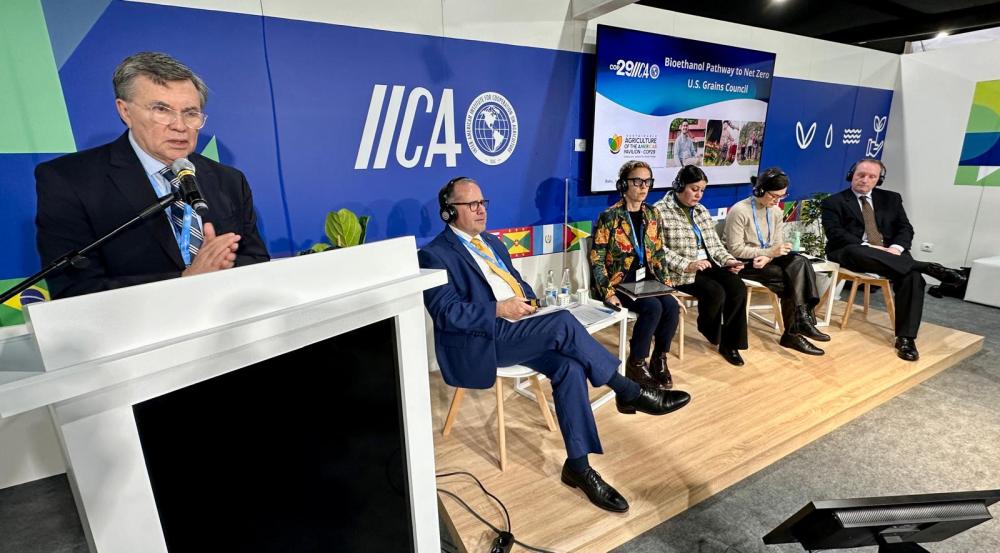Actors from the continent reported on the results already being achieved through bioethanol and biodiesel in reducing greenhouse gas emissions from transportation, at the world’s largest environmental forum.

aku, Azerbaijan, 19 November 2024 – Countries of the Americas showcased the extraordinary potential of their biofuel production to reduce dependence on fossil fuels and contribute to global objectives for mitigating environmental damage, at the pavilion of the Inter-American Institute for Cooperation on Agriculture (IICA) at COP29.
Actors from the continent reported on the results already being achieved through bioethanol and biodiesel in reducing greenhouse gas emissions from transportation, at the world’s largest environmental forum.
The Home of Sustainable Agriculture of the Americas, a collaborative space set up by IICA at the venue in Baku, thanks to the efforts of its private and public sector partners, presented a panel that brought together leaders from various regional biofuel entities.
Gloria Alvarenga, Director of Integration, Access, and Energy Security at the Latin American Energy Organization; Linda Schmid, from the U.S. Grains Council; Lais García from the Renewable Energy Division of the Brazilian Ministry of Foreign Affairs; and Andrew Matters, Director of Policy and Economics at the International Air Transport Association (IATA) participated in the panel.
The opening remarks were shared by Manuel Otero, Director General of IICA, while Lloyd Day, Deputy Director General of IICA, moderated the discussion.
The speakers emphasized that public policies supporting biofuels in the region must be stable, predictable, long-term, and also aligned with major global regulations.
Andrew Matters discussed the extraordinary opportunity that sustainable aviation fuels (SAF) represent for Latin America, due to the region’s vast biomass resources.
“Sustainable aviation fuels are unconventional fuels, produced from raw materials other than petroleum. They can be made from cooking oil, plant oils, urban waste, or agricultural residues,” he said.
Matters explained that SAFs are still in their early stages, as they are currently two to four times more expensive than conventional fuels, which has a significant impact on airlines.
“The outlook is very promising for 2030. Today, there are already 130 SAF projects underway worldwide, mostly in Europe and the Americas. We are open to all raw materials, and we consider that fuels made from soybean oil, corn, and sugarcane are key to achieving carbon neutrality by 2050,” Matters stated.
The International Energy Agency predicted in 2023 a 225% increase in biodiesel consumption by 2040, driven by agriculture’s role in providing raw materials. SAFs, in particular, could contribute to a 65% reduction in emissions by 2050, with a key role for the Americas.
Energy Transition
Lais García, from the Renewable Energy Division of Brazil’s Ministry of Foreign Affairs, said that Brazil believes there are different paths to energy transition. “For some nations, the electrification of transportation is an appropriate route, but for others, it is not. When we talk about energy transition, we also talk about development, and ethanol is an excellent tool that can be produced in many regions.”
“All sugar-producing countries can have an ethanol industry. Brazil is already one of the leaders in biofuel production, and today we have the Future Fuels program, recently approved by the Brazilian Parliament, which constitutes an ambitious decarbonization plan through the expansion of liquid biofuels use. Between 2025 and 2037, we plan to save the importation of 26 billion liters of gasoline thanks to ethanol blending,” she added.
Linda Schmid from the U.S. Grains Council pointed out that ethanol should be considered by countries as part of their greenhouse gas emission reduction commitments under the Paris Agreement.
Gloria Alvarenga from OLADE stated that Latin America is one of the greenest regions in the world. “Our electric matrix is made up of 31% renewable sources, while the global average is 14%,” she reported.
Regarding ethanol and biodiesel, she specified that production and consumption are concentrated in Brazil, Argentina, and Colombia, where they play a central role in transportation. “We have—she concluded—vast biomass resources that are ideal for biofuels, such as sugarcane, soy, corn, and palm oil. The biofuel industry can stimulate economic growth and create jobs, especially in rural areas, in addition to reducing dependence on fossil fuel imports.”
More information:
Institutional Communication Division.
comunicacion.institucional@iica.int











